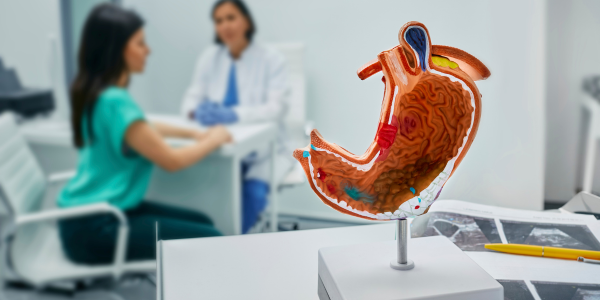
Bariatric Specialist Dietitian Nichola Ludlam-Raine
Nicsnutrition.com – @nicsnutrition
Nichola is a Specialist Bariatric Dietitian with over 15 years of clinical experience working for the NHS as well as privately. Nichola has a First class BSc Honours in Sport & Exercise Science from Loughborough University, a Post Graduate Diploma in Dietetics from Leeds, an MSc in Health Science and she is a published author in the Journal of Human Nutrition & Dietetics. Nichola has also obtained a Diploma in Diabetes Management in Primary Care as well as certificate in Personal Training, with pre and postnatal specialism.
Nichola frequently features on live as well as pre-recorded T.V. and she is a regular on the BBC Breakfast sofa. Online, Nichola is a well-known nutrition, health and fitness influencer as well as award winning (verified) food blogger (@nicsnutrition), and also mummy blogger (@mummynutrition), posting a variety of health and lifestyle content to over 100,000 followers across her social media platforms.
A staggering nine out of 10 people living with obesity say they’ve been stigmatised, criticised or abused because of their weight. Bariatric surgery offers patients a long-term solution to obesity and can improve not only physical but mental health as well.
This blog will cover the four main different types of bariatric surgery in the UK, as well as the nutritional guidelines both before and after. It will also cover the vitamins and minerals that are required lifelong.
WHAT IS BARIATRIC SURGERY?
Bariatric surgery involves (usually key-hole) surgery to help reduce weight, improve metabolic diseases and ultimately improve a person’s quality of life. The four most common types of surgery, which help a person to feel fuller with smaller portions, are the gastric bypass, the gastric sleeve, the gastric band and the gastric balloon –
GASTRIC BYPASS* – This operation divides the stomach into two parts, and connects the smaller upper section directly to the small intestine, bypassing the rest of the stomach, the duodenum, and the upper intestine. The patient subsequently feels less hungry and fuller with smaller portions.
GASTRIC SLEEVE* – This surgery permanently removes around 75% of the stomach, leaving a narrow tube or sleeve which helps patients feel fuller with a smaller portion of food.
*A patientʼs metabolism is also affected following these procedures, which helps to facilitate weight loss.
GASTRIC BAND – This operation sees an inflatable silicone device placed around the top portion of the stomach which aims to decrease food consumption by making the patient think that they have eaten more than what they have – it does not work via restriction and can ʼslipʼ if eating behaviours are pushed.
GASTRIC BALLOON – A much less invasive procedure during which an intragastric silicone balloon is inserted into the stomach (often by patients swallowing a tablet), and is filled with saline, causing the patient to feel fuller. A gastric balloon is a temporary intervention, usually staying in the stomach for 4 to 12 months.
WHO IS ELIGIBLE?
Weight loss surgery is available on the NHS if:
- A patient has a body mass index (BMI) of 40kg/m2 or more, or a BMI between 35kg/m2 and 40kg/m2 with comorbidities i.e. a condition that may improve with weight loss (such as type 2 diabetes or high blood pressure)
- The patient has tried other weight loss methods, such as dieting and exercise, but has struggled to lose weight or keep it off
- The patient agrees to long-term follow-up – as well as making healthy lifestyle changes and attending regular check-ups
HOW MUCH WEIGHT CAN A PATIENT LOSE?
Following a gastric bypass or a gastric sleeve, patients can lose around 60-70% of their ‘excess body weight’ in 1 to 2 years, some patients can lose 100%. Following a gastric band patients can expect to lose around 50% of their excess weight in 1 to 2 years, and after gastric balloon insertion patients can lose around 10-20% of their body weight in 4 to 12 months1,2. Excess body weight is defined as any weight above that of a BMI of 25kg/m2.
WHAT DIET NEEDS TO BE FOLLOWED PRE-OP?
Prior to weight loss surgery (gastric bypass or sleeve), it is essential that patients follow a strict calorie and carbohydrate controlled eating plan for at least two weeks. This is to reduce the size of the liver, which contains large amounts of glycogen and water, so that the stomach can be easily accessed via keyhole surgery. A liver shrinkage diet does not need to be followed prior to a gastric band or a gastric balloon.
There are 4 main eating plans which bariatric dietitians may offer (in addition to having a complete A to Z multivitamin) –
- Restricted food portion/food group eating plan – This eating plan is designed to provide approximately 80 to 100g of carbohydrate per day. It is low in fat and moderate in protein. The energy plan is between 800-1000 calories (kcal) per day and patients will be allowed to eat 3 x small portions of carbohydrates a day (i.e. one at each meal), 2 x small portions of protein (i.e. one at lunch and one at evening meal), 2 x pieces of fruit, 3 to 5 portions of vegetables and 2 x portions of milk/dairy.
- Calorie controlled diet eating plan – If patients are familiar with calorie counting, they can choose their own eating plan to a maximum of 800 to 1000 calories per day (and 80-100g carbohydrates a day). Apps such as My Fitness Pal and Nutracheck are often recommended.
- Meal replacement eating plan – On this plan patients can choose to either have 3 to 4 meal replacement products per day (at 200-250 calorie each), e.g. 2 milk shakes and 1-2 soups, or patients can use meal replacement products combined with real food i.e. patients can replace two meals with two meal replacement products and have a 450 calorie meal in the evening (this could be a ready meal for example). Dietitians may recommend the latter so patients can still enjoy some food before starting the liquid only diet post surgery.
- Milk & yoghurt plan – This plan involves patients drinking just 3 pints of milk a day (can be flavoured with sugar free options or included within teas and coffees) OR having 1 pint of milk a day plus 8-10 low calorie yoghurts. If dairy intolerance is an issue lactose-free milk or yoghurt, in addition to soya alternatives to milk and yoghurts can be suggested as their calorie and protein contents are comparable. Nut based alternatives to milks and yoghurt are not usually recommended.
WHAT DO PATIENTS EAT AFTER SURGERY?
Immediately after bariatric surgery, time is needed for the internal stitches to heal and the swelling to calm down. The digestive system will gradually adjust to drinks and food as time goes on. Recovery will vary from patient to patient but it can take three to six months for the body to settle. During this time patients usually take a proton pump inhibitor (PPI) twice daily (BD) and then once daily (OD) from 6 months post op but advice varies surgeon to surgeon.
Advice varies around the country but typically patients commence on water only in hospital then have tea, coffee, broth and finally free fluids for 1 to 4 weeks post op. Liquids must be non-fizzy and sugar-free. Following the liquid diet, patients progress onto purees, soft and then crispy textures. Foods and drinks need to be separated by around 30 minutes to avoid dumping syndrome (food being pushed through too quickly), stomach stretching and vomiting.
Dietitians usually suggest starting with 50 then 100 then 200ml/hour and building this up as tolerated. Aiming for 1.5 to 2 litres of fluid a day (all drinks count towards this amount). Patients should aim to consume at least 60g of protein a day within a week after surgery i.e. 3 pints of nutritious drinks such as milk or meal replacement drinks (or protein shakes) and an additional 1 pint of clear fluid such as water or squash for hydration. Consuming enough protein a day not only helps the body to recover from surgery but helps to minimise muscle loss whilst losing weight. A chewable multivitamin during this time is recommended, as well as the antacid prescribed e.g. lansoprazole. Patients can usually move onto a tablet A-Z 4 week post op.
Patients are advised to avoid certain foods for the first few weeks and may or may not be able to manage some foods such as chewy meats or doughy bread on a more longer term basis.
Common foods to be cautious of for the first few months include –
- Bread – especially doughy bread
- Overcooked rice or pasta
- Chapattis
- Lettuce
- Pips, seeds, skins, pith (peel first initially)
- Dried fruit
- Sweetcorn
- Nuts
- Stringy vegetables e.g. green beans, celery
- Grilled, roast or fried meat and chicken (stick to minced/wafer thin)
- Avoid all fizzy and sugary drinks long-term.
When textures are introduced it is advised that patients eat their meals slowly, taking small mouthfuls (no bigger than a 20p piece) and chew their foods very well (20 times before swallowing). The post op digestive system may be sensitive to spicy foods so these should be added to the diet slowly and in small amounts.
Aiming for three meals a day and a couple of healthy snacks is recommended long term, introducing one new food at a time so that patients can see how their body tolerates it.
WHAT VITAMINS ARE NEEDED FOLLOWING BARIATRIC SURGERY?
As per BOMSS, post gastric bypass and sleeve, patients are required to take:
- A multivitamin supplement e.g. Forceval or OTC equivalent BD
- A calcium and vitamin D supplement providing at least 1000mg and 20mcg respectively
- An iron supplement (amounts vary depending on menstruation)
- A vitamin B12 injection every 3 months due to loss of the intrinsic factor (prescribed by the GP)
- Following a gastric band or gastric balloon an A to Z should be taken as a minimum.
SUMMARY
Bariatric surgery is major surgery, however for the right person it offers a second chance at life. It improves mobility, quality of life, mental health and lifestyle related diseases such as type 2 diabetes, which if caught early can even be put into remission. On average, the costs of surgery outweighs the financial implications of obesity and health practitioners should be educated as to how best to support patients undergoing this lifesaving procedure.
FURTHER READING
BOMSS NUTRITION GUIDELINES FOR GPs
Weight Loss Surgery – The Essential Guide by Mr Bilal Alkaffaf
References
- Palumbo P, Banchelli F, Miloro C, et al. Weight loss trend after bariatric surgery in a population of obese patients. Clin Nutr ESPEN. 2023;57:58-64. doi:10.1016/j.clnesp.2023.06.015
- Maciejewski ML, Arterburn DE, Van Scoyoc L, Smith VA, Yancy WS Jr, Weidenbacher HJ, Livingston EH, Olsen MK. Bariatric Surgery and Long-term Durability of Weight Loss. JAMA Surg. 2016 Nov 1;151(11):1046-1055. doi: 10.1001/jamasurg.2016.2317. PMID: 27579793; PMCID: PMC5112115.
YOU MAY ALSO BE INTERESTED IN:






